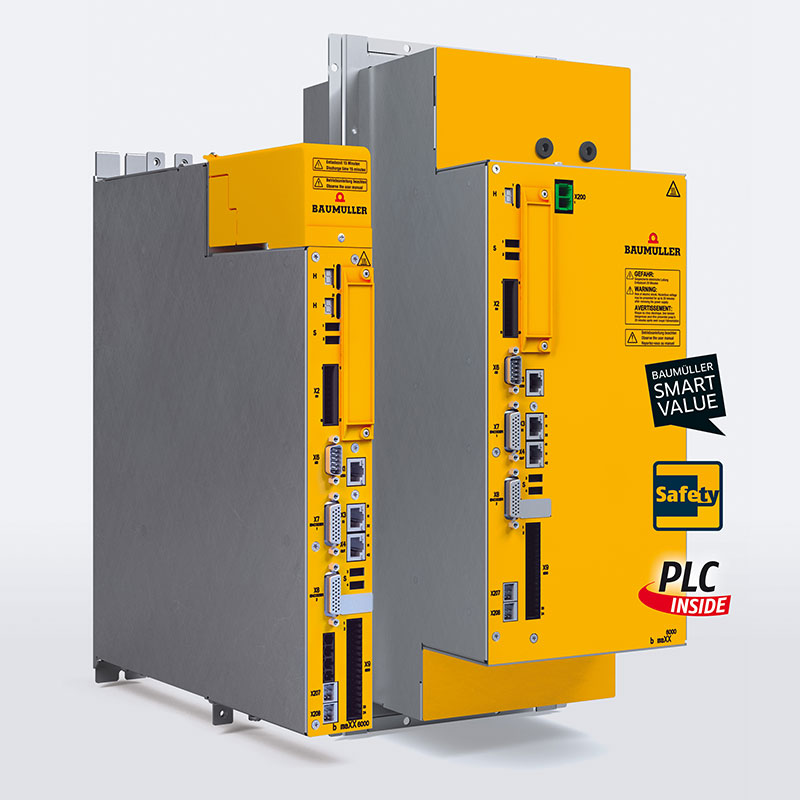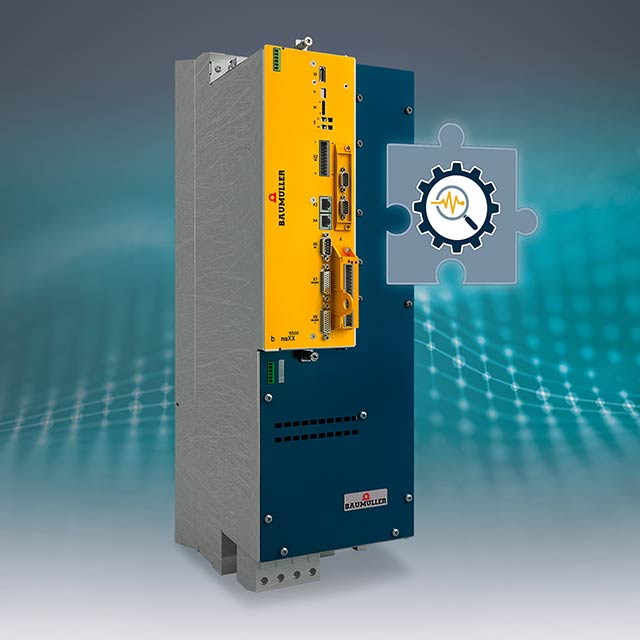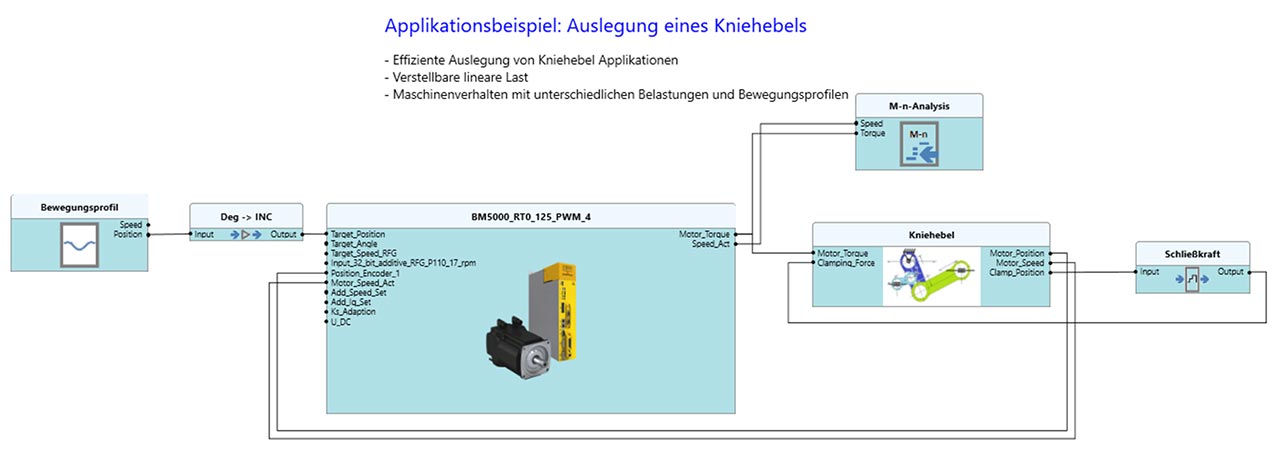Increasing Productivity with Drive Intelligence
Baumüller will be presenting an entirely new automation system at the SPS 2023
This year, SPS is focusing on the megatrend of automation: productivity, sustainability, and connectivity. Baumüller is launching numerous new products that engage with these trends. On November 14–16, 2023, in Hall 1 at Stand 560 of the Nuremberg trade fair grounds, the Nuremberg automation specialist will exhibit an entirely new runtime system for PLCs, the servo converter range b maXX 6000 including drive-integrated performant control unit b maXX PLC di and the new DSC2 generation of motors. New tools for smart energy monitoring in the drive, along with new ways to model mechanics for drive simulation, are likewise increasing performance along all steps of the machine manufacturing value chain.
One of the fastest drive-integrated PLCs on the market
Even more flexibility for automation systems: In the servo drives of the new b maXX 6000 range, the drive-integrated control unit b maXX PLC di (“drive-integrated”) handles scalable control tasks up to high-performant synchronous multi-axis applications. This reduces the demand on, minimizes, and accordingly replaces central process loop control, since the PLC di can also be used as EtherCAT Master to control additional servo converters. With minimal field bus cycle times of up to 250 µs, the integrated control unit is one of the fastest drive-integrated PLCs on the market.
 Even more flexibility for automation systems: In the servo drives of the new b maXX 6000 range, the drive-integrated control unit b maXX PLC di (“drive-integrated”) handles scalable control tasks up to high-performant synchronous multi-axis applications
Even more flexibility for automation systems: In the servo drives of the new b maXX 6000 range, the drive-integrated control unit b maXX PLC di (“drive-integrated”) handles scalable control tasks up to high-performant synchronous multi-axis applications
Through digital inputs, the b maXX PLC di reacts in real time to important events such as touch probes. The advantage: The control unit works with greater efficiency and safety, in particular in environments requiring fast response times.
In addition, the drive-integrated PLC also allows the implementation of smart applications in addition to movement control. The extremely fast interface between PLC di and servo-controller (local axis) provides access to drive parameters such as voltage, current, power, torque, revolutions per minute, and position. Using their own control algorithms and IoT functionalities, engine manufacturers can thus offer their clients added value.
Completely new IoT solutions become possible using the analog high-speed inputs (no additional hardware required, minimum scanning time 1 μs). For example, a mechanical vibration sensor can be attached directly, so as to perform a vibration analysis directly in the drive system PLC.
This excellent connectivity enables the design of highly flexible and modular structures through interfaces such as OPC, UA, MQTT, EtherCAT, and Ethernet. The b maXX PLC di is thus ideally set up for future requirements regarding automation or the Internet of Things.
Faster engineering, greater performance
When it comes to control technology, Baumüller relies on open systems and simplified engineering: With the new runtime environment IEC 61131, developed entirely in-house, Baumüller offers a platform that supports current standards such as high-level programming languages and IoT connectivity. This ensures that Baumüller will continue to be able to react flexibly to client requirements in the future.
The runtime system is based on Linux and allows the coding of PLC programs using object-oriented programming. This makes it possible to build modular, reusable and clearly structured programs. Such programs not only reduce developer workloads in project implementation, but also increase flexibility. Existing templates, machine modules, and libraries following the PLCopen standard can still be used.
High-level programming languages such as C++ are likewise integrated into the platform. The advantage: System expansion after the fact and cross-platform use are simpler than ever before. This improves development efficiency, reduces time-to-market, and increases the flexibility of the overall system.
The new runtime system is available for the drive-integrated b maXX PLC di from launch. It will also be made available later for Baumüller’s other control platforms.
Boost your performance, reduce your footprint
 New converter generation: With the new b maXX 6300 side-by-side devices and the b maXX 6500 mono units, Baumüller is offering a new generation of its well-known b maXX platform.
New converter generation: With the new b maXX 6300 side-by-side devices and the b maXX 6500 mono units, Baumüller is offering a new generation of its well-known b maXX platform.
The new b maXX 6000 servo controller generation stands for more performance and maximum scalability. The increase in performance is achieved for example through newly developed safety functionalities which were devised specifically for applications requiring especially dynamic and precise handling. In the new servo-controllers, the safety module is integrated directly into the device. This allows safety-relevant encoder signals to be analyzed at an even higher resolution. That way, speed and position precision can once again be significantly improved, helping reduce machine cycle times.
Numerous hardware and software options ensure maximum scalability, so that drives can be even better adapted to the requirements of the specific application. A large number of encoder, hardware, and safety options is available. For the hardware, the signal bus, service option, digital and analog I/Os, and brake connection can be selected, among other things. With regard to safety, different variations are available, from the simple hardware-controlled STO (Safe Torque-Off) through to higher safety functions actuated via FSoE (FailSafe over EtherCAT), all of which comply with the highest safety level.
Baumüller is also setting new standards for device dimensions: In addition to the space-saving side-by-side system (b maXX 6300), the mono units (b maXX 6500) are also significantly more compact. The installation volume is thus greatly reduced, enabling even smaller control cabinets.
But the servo can do a lot more: the drive can be used as a sensor/sensor hub and provides scalable IoT connectivity, for example as a cloud link through edge computing.
Even more performance, even smaller space
The new DSC servo motors are the next generation for applications requiring high torque densities. Their low weight and small dimensions make them the series of choice. One of the reductions was in installed length, making the DSC2 significantly more compact while maintaining the same performance.
Like the DSC1 product family before them, the DSC2 motors are scalable and easy to adapt to specific requirements. The numerous encoder and cooling options, optional break, various compatible gear variants and many additional options ensure that the DSC2, as well, can be matched perfectly with its individual area of application.
 With the newly developed software solution Smart Vibration Monitoring, condition monitoring can be implemented with no sensors at all. The software is integrated directly into the servo controller, allowing easy retrofitting
With the newly developed software solution Smart Vibration Monitoring, condition monitoring can be implemented with no sensors at all. The software is integrated directly into the servo controller, allowing easy retrofitting
Increasing productivity and enabling new business models through smart drive solutions
Condition monitoring solutions allow operators to keep track of the condition of many machines on a regular basis. For example, wear on motors can be identified early, preventing potential machine downtimes. However, if this function is performed via sensor, it can quickly get very complicated and costly, depending on the type of machine and the number of motors used, such as in a textile machine.
The new Smart Vibration Monitoring software solution allows machine manufacturers to offer their clients condition monitoring without external sensors. The software is directly integrated in the servo-controller using softdrivePLC, making it easy to retrofit and update. Machine manufacturers thus have new options, such as offering runtime models for additional machine functions.
The new function uses previously recorded and analyzed process parameters as reference values for monitoring the mechanics, such as the electric motor, fan, or hydraulic pump. The software detects vibrations, such as those created by imbalance or improper alignment, early on and sends an error signal. This allows planned maintenance to be carried out on the motor, preventing further damage to or failure of the machine.
Determining and reducing the product carbon footprint
In times of rising energy costs, solutions are in demand that can help determine energy consumption and then reduce it in a targeted way. With its new Smart Energy Monitoring software function, Baumüller now presents a solution for the intelligent energy monitoring of machines and systems. The software transparently measures energy use/consumption of individual production steps and then optimizes energy use based on a reference measurement. This last also serves as an initial value for detecting energy changes in the production process. Warning and error thresholds can then be set on the basis of these values.
The software is loaded directly onto the servo-controller. This makes it easy to retrofit and update, allowing the machine manufacturer to market it as an additional function. Energy consumption is recorded directly via the intelligent drive. This saves additional costs for unnecessary external sensors and reduces the amount of wiring required.
The new function supports determining energy use/consumption both overall and for each individual axis of the drive system per cycle. The energy measurement is performed autonomously and in real time in the Baumüller b maXX servo converters. Measurement and results can be easily displayed through machine visualization or on the dashboard displays of open IoT interfaces for alternative devices, such as OPC and UA.
Optimized engineering and increased productivity thanks to a digital twin
Baumüller offers a wide variety of controller and mechanics models for virtual commissioning. The advantage: Using the engineering tool ProSimulation, the machine manufacturer can determine the ideal drive system and ideal operating site. In particular for more complex non-linear processes, the tool simulates different movement profiles in order to find the ideal drive system. This saves the machine builder valuable time in designing the machine, and reduces energy costs and thus the CO2 emissions of the machine from the very beginning. In addition, the simulation makes it possible to determine ahead of time whether the required performance values will be reached.
The latest model simulates the knee lever in the clamping unit of an injection molding machine. On request, Baumüller’s simulation experts can adapt the modeled mechanics to individual machine types.
 ProSimulation offers the possibility of testing the drive behavior realistically during the design phase, and in addition to optimal design of the drive components, also enables faster commissioning. The latest model simulates the knee lever in the clamping unit of an injection molding machine.
ProSimulation offers the possibility of testing the drive behavior realistically during the design phase, and in addition to optimal design of the drive components, also enables faster commissioning. The latest model simulates the knee lever in the clamping unit of an injection molding machine.
Life-cycle management worldwide
In addition to the development and manufacture of drive and automation components, the Baumüller group of companies provides numerous services for plant and machinery manufacturing and for machine operators. From project planning, design and engineering through assembly and commissioning to maintenance, retrofitting and relocation, Baumüller offers support over the entire life cycle of machines and systems. With over 40 branches worldwide, Baumüller is a reliable service partner with decades of experience. Baumüller attaches particular importance to the sustainable and resource-saving production of intelligent drive and automation solutions.
SPS 2023, November 14-16, 2023
Hall 1, Stand 560 – NürnbergMesse, Nuremberg